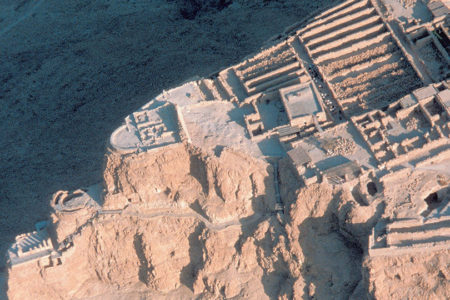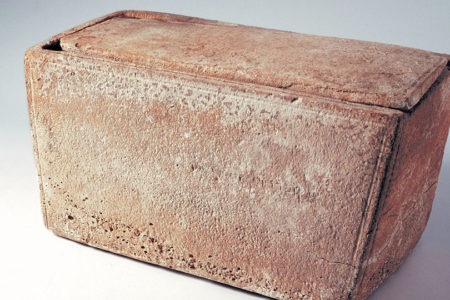God is Sovereign Part Two
Webster’s New International Dictionary defines the adjective sovereign as follows: “Supreme or highest in power; superior in position to all others,” and “Independent of, and unlimited by, any other; possessing, or entitled to, original and independent authority or jurisdiction.”
King Nebuchadnezzar of Babylon called Jehovah “the Most High God” and declared, “There is no other God that can deliver after this sort” (Dan. 3:26, 29). Such exaltation indicates that Jehovah is “supreme or highest in power; superior in position to all others.”
God Himself declared, “Before me there was no God formed, neither shall there be after me” (Isa. 43:10). “I am the first, and I am the last, and beside me there is no God” (Isa. 44:6). Jehovah is “independent of, and unlimited by” other gods and possesses and is “entitled to, original and independent authority or jurisdiction.”
Thus the God of the Bible is sovereign. Additional biblical revelation supports and reinforces that conclusion.
Assertions of Sovereignty
Assertions by God. Jehovah asserts that He is sovereign. In Isaiah 14:24, 26–27 He declares,
The LORD of hosts hath sworn, saying, Surely as I have thought, so shall it come to pass; and as I have purposed, so shall it stand: . . . This is the purpose that is purposed upon the whole earth, and this is the hand that is stretched out upon all the nations. For the LORD of hosts hath purposed, and who shall annul it? And his hand is stretched out, and who shall turn it back?
In Isaiah 43:12–13 He states, “Ye are my witnesses, saith the LORD, that I am God. Yea, before the day was, I am he; and there is none that can deliver out of my hand; I will work, and who shall hinder it?”
In Isaiah 46:9–11 He asserts,
I am God, and there is none else; I am God, and there is none like me, Declaring the end from the beginning, and from ancient times the things that are not yet done, saying, My counsel shall stand, and I will do all my pleasure; Calling a ravenous bird from the east, the man that executeth my counsel from a far country; yea, I have spoken it, I will also bring it to pass; I have purposed it, I will also do it.
God also declares, “So shall my word be that goeth forth out of my mouth; it shall not return unto me void, but it shall accomplish that which I please, and it shall prosper in the thing whereto I sent it” (Isa. 55:11).
Assertions by Others.The Bible records angelic and human assertions of God’s sovereignty.
Job said the following concerning God: “He breaketh down, and it cannot be built again; he shutteth up a man, and there can be no opening” (Job 12:14). Also, “He is of one mind, and who can turn him? And what his soul desireth, even that he doeth” (Job 23:13).
King Jehoshaphat of Judah exclaimed,
O LORD God of our fathers, art not thou God in heaven? And rulest not thou over all the kingdoms of the nations? And in thine hand is there not power and might, so that none is able to withstand thee? (2 Chr. 20:6).
An angel stated, “The Most High ruleth in the kingdom of men, and giveth it to whomsoever he will, and setteth up over it the basest of men” (Dan. 4:17).
King Nebuchadnezzar of Babylon declared,
I blessed the Most High, and I praised and honored him who liveth forever, whose dominion is an everlasting dominion, and his kingdom is from generation to generation. And all the inhabitants of the earth are reputed as nothing; and he doeth according to his will in the army of heaven, and among the inhabitants of the earth, and none can stay his hand, or say unto him, What doest thou? (Dan. 4:34–35).
Spheres of God’s Sovereignty
The Bible reveals various spheres over which God has sovereign rule.
The Universe. God’s significant relationships with the universe indicate He is sovereign over it.
The fact that God created the universe signifies He is its sovereign.
In line with its Genesis 1 account of creation, the Bible repeatedly asserts that Jehovah is the source of the entire universe’s existence. For example, Moses stated, “For in six days the LORD made heaven and earth, the sea, and all that in them is” (Ex. 20:11; cf. Rev. 10:6).
In His dialogue with Job, Jehovah emphasized His unique wisdom and power, through which He created the heavens; stellar bodies; and Earth, with its features, life forms, and the ordinances by which they operate (Job 38—41).
In Isaiah 40, Jehovah stresses that He alone has the knowledge and power to create the earth with precise measurements, the great expanse of the heavens with the right number of stellar bodies, and to call all those bodies by name (vv. 12–14, 22, 26). In light of this, He insinuated that no one can be compared to or equal with Him, “the everlasting God, the LORD, the Creator” (v. 28; cf. Isa. 42:5; 45:12, 18; Jer. 10:12).
God declares, “I am a great King” (Mal. 1:14) and indicates the sphere of His rule when He says, “The heaven is my throne, and the earth is my footstool” (Isa. 66:1). Edward J. Young explained that the latter statement asserts, “God is King of all and rules over all, and that all creation (heaven and earth; cf. Gen. 1:1) is subject to Him.”1 God signifies that He has that rule because He created the entire universe (Isa. 66:2).
David wrote, “The LORD hath prepared his throne in the heavens, and his kingdom ruleth over all” (Ps. 103:19). King Nebuchadnezzar of Babylon honored God as “the King of heaven” (Dan. 4:37), and Psalm 47:2 declares, “The LORD Most High…is a great King over all the earth” (cf. v. 7).
According to the twenty-four elders in heaven, God “created all things [the entire universe]” (Rev. 4:11; cf. Neh. 9:6; Col. 1:16; Rev. 10:6). The Greek text in verse 11 indicates that God created the entire universe because of His sovereign will.2
The apostle Paul recognized that, as its Creator, God is sovereign over the universe: “God, who made the world and all things in it…is Lord of heaven and earth” (Acts 17:24). The word translated “world” refers to the universe.3 Thus Homer A. Kent, Jr. wrote, “Paul explained that God is the creator, the sovereign of heaven and earth.”4
Psalm 93:1 proclaims, “The LORD reigneth,” asserting God’s sovereign rule. Then it states, “Thy throne is established of old; thou art from everlasting” (v. 2). It thereby draws a contrast between God’s existence and the beginning of His sovereign rule. God has always existed; He is eternal. But His “throne” (sovereign rule) was not established until creation.5 Thus, in eternity past, God, on the basis of His own sovereign will, determined to have a kingdom over which He could rule as sovereign King. He created the entire universe and everything in it to be His universal Kingdom.
The fact that God owns the universe signifies that He is sovereign over it.
The Bible teaches that God owns the universe and everything in it. Moses declared, “Behold, the heaven and the heaven of heavens belong to the LORD thy God, the earth also, with all that therein is” (Dt. 10:14). Psalm 89:11 asserts, “The heavens are thine; the earth also is thine; as for the world and the fullness thereof, thou hast founded them.”
David indicated that God is sovereign over the universe He owns:
Thine, O LORD, is the greatness, and the power, and the glory, and the victory, and the majesty; for all that is in the heaven and in the earth is thine. Thine is the kingdom, O LORD, and thou art exalted as head above all. . . . thoureignest over all (1 Chr. 29:11–12).
The fact that God sustains the universe indicates that He is sovereign over it.
In Colossians 1 the apostle Paul asserted that the Son is the Person of the triune Godhead who not only created the universe (“all things,” v. 16), but also sustains it (“by him all things consist,” v. 17). F. F. Bruce pointed out that the Greek word translated “consist” indicates that Christ “is the sustainer of the universe and the unifying principle of its life.”6
To sustain the universe, Christ must have supremacy over all of creation. Paul’s designation of Christ as “the first-born of all creation” (v. 15) indicates that He has that supremacy.7
The writer of Hebrews, after stating that God created “the worlds” by His Son (v. 2), declared that the Son is “upholding all things by the word of his power” (v. 3), indicating that Christ continuously sustains the entire universe.8
The fact that God will judge the universe indicates that He is sovereign over it.
David wrote that the Lord “hath prepared his throne for judgment. And he shall judge the world in righteousness” (Ps. 9:7–8). God declares, “I will shake the heavens, and the earth, and the sea, and the dry land” (Hag. 2:6, 21). God will cause disturbances in the heavens and devastations on the earth during the seven-year Tribulation and Christ’s Second Coming (Rev. 6— 19; Mt. 24:29), and He will destroy the present heavens and earth after the Millennium (2 Pet. 3:10–12; Rev. 20:11; 21:1).
ENDNOTES
- Edward J. Young, The Book of Isaiah (Grand Rapids: Eerdmans, 1972), 3:518.
- Robert L. Thomas, Revelation 1–7, An Exegetical Commentary (Chicago: Moody Press, 1992), 367.
- “kosmos,” A Greek-English Lexicon of the New Testament, /trans. William F. Arndt and F. Wilbur Gingrich (Chicago: University of Chicago Press, 1957), 446.
- Homer A. Kent, Jr., Jerusalem to Rome: Studies in Acts (Winona Lake, Ind: BMH Books, 1972), 140.
- Willem A. VanGemeren, “Psalms” in The Expositor’s Bible Commentary (Grand Rapids: Zondervan, 1991), 5:608.
- F. Bruce, “Commentary on the Epistle to the Colossians” in Commentary on the Epistles to the Ephesians and Colossians (Grand Rapids: Eerdmans, 1957), 200.
- Wilhelm Michaelis, “prototokos,” Theological Dictionary of the New Testament (Grand Rapids: Eerdmans, 1968), 7:879.
- Leon Morris, “Hebrews” in The Expositor’s Bible Commentary (Grand Rapids: Zondervan, 1981), 12:14.







